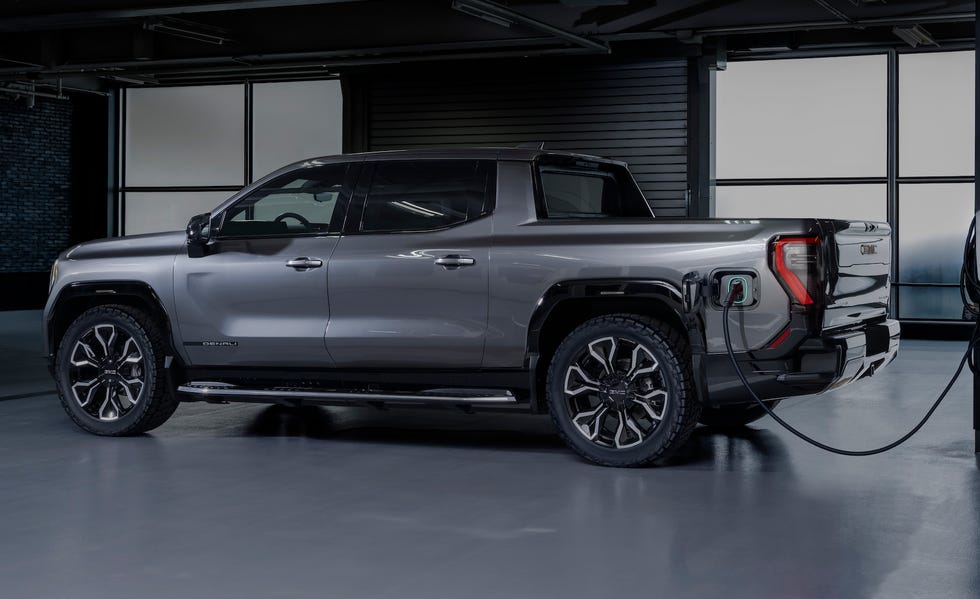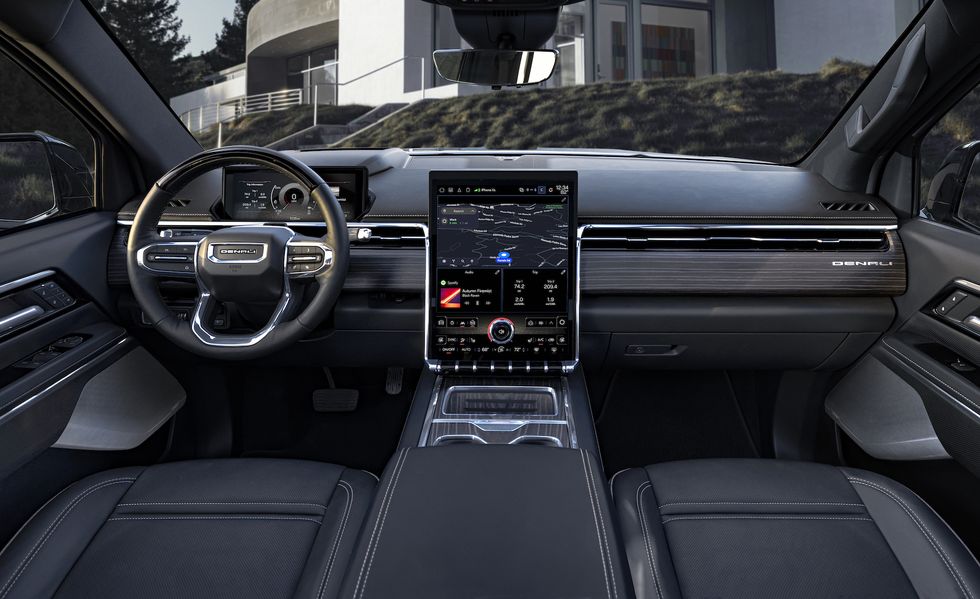GMC stunned the tech world at CES 2022 unveiling their vision for an all-electric Sierra pickup that looks toward a sustainable future for workhorses. With bulging fenders and the unmistakable Sierra grille, the concept showed how iconic styles can propel us into new energy frontiers.
The Magic happens under the expanded frunk, where GM’s advanced Ultium batteries provide the electricity for a revolution. With four electric motors providing precise power to each wheel, the Sierra EV will stalk dusty trails or busy highways with ease and endurance thanks to its versatile skateboard chassis.
Heavy loads up to 10,000 pounds stand no chance when their EV unleashes an expected 664 stallions pulling from zero to heroic in less than five ticks. Yet its true strength is a range aimed at 400 freedom-filled miles between charges – more than enough for many worksite commutes before recharging in the peace of an evening barn.
Aerodynamic surfaces slice the wind with expert precision, guiding the Sierra EV toward its destination with minimal wasted energy. Inside, a soothing symphony of screens provides all the necessary tools and entertainment using materials that nourish not just a driver but the earth. Crafted bamboo feels authentic yet sustainable within reach.
A multifunction midgate brings versatility, whether fully closed to protect precious payloads or rolled open to lug lumber of any length. Custom lockboxes keep tools honest while clever outlets offer power for any jobsite. Running lights illuminate night work like stars in the sky.
Four intelligent wheels steer this mobile work center with agility, from the tight confines of a delivery route to rocky terrain. An adaptive suspension modulates its 1-ton stance for comfort on the highway or hustle off-road. Super Cruise takes transit stress off skilled trades, allowing focus on construction not driving distraction.
Cameras give visibility for cautious cargo loading while also livestreaming work projects or adventures. GM Energy batteries make any electric tool mobile when unplugged. Bose audio helps make backcountry builds truly beautiful through killer soundtracks. Surprise, the party starts here!
Bring on the hauls with a MultiPro Tailgate crafted for convenience and Trailering tech optimized for big tows. AC and DC power provision keep job sites buzzing from this mobile generator. Over-the-air chances bring new life to each truck via software just like nature’s seasons. Built to evolve, the future looks bright!

Composite trucks minimize weight for maximal torque transfer to precious payload dirt. Four-wheel balance bars plus carbon reduce roll for tight maneuvers loaded or light. Drive modules shine with propulsion and management for work duties and weekend escapes under the sun or stars.
From the falcon wings that welcome, to the drive system that moves with purpose and precision, the Sierra EV concept Awakened imaginations to redefine work and adventure for coming generations. Its supercharged specs say the future is now for emission-free endeavors. Clean sheet metal hints at what’s to come as ideas take production form. Stay tuned!
The Sierra EV is aiming high – with a targeted range of 400 miles, this electric pickup could truly go the distance on a single charge. Enough for an all-day job site plus the drive home, or a full weekend of camping off-grid in the wilderness. range anxiety becomes a thing of the past.
With output projected at over 664 horsepower and acceleration to 60 in about 4.5 seconds, this zero-emissions truck certainly won’t lack for gusto. Contractors can say goodbye to lugging around heavy equipment – the Sierra EV will power through with aplomb.
The integrated wheel hub motors allow for precise torque control in tricky situations like slippery slopes or tight turns with a full bed. This is sure to boost confidence both on and off the pavement.
An adaptive air suspension lets drivers dial in the ride for any surface. Cruise comfortably on the highway fully loaded, then switch to off-road mode to easily traverse job sites made of mud or dirt without skipping a beat.
With 22-inch wheels wrapped in beefy off-road tires, the styling emits a serious vibe that’s ready for rugged terrain. Yet inside lurks a surprisingly serene cockpit with sustainability as a priority.
Bamboo is unexpectedly at home in this high-tech hauler. As a rapidly renewable resource, it brings an organic touch to offset high-strength composites and minimize the electric truck’s footprint in every way.
Quad electric motors power all four wheels individually, allowing for torque vectoring to maximize traction on slippery surfaces. This truck aims to go places traditional pickups could only dream of.
Second-row seats fold flat at the touch of a button to provide a work surface or sleeping area on job sites far from home. Finally, an electric truck that’s equally at home on the highway or out in the wilds.
With numerous tuning drive modes, the Sierra EV can morph its personality depending on needs – from laidback eco-cruising to balls-to-the-wall wide-open throttle wizardry. There’s a setting for every driving style under the electric sun.
The Multi-Flex Midgate can partition the bed for secure transport, and then fold flat with the push of a button for carrying extra-long materials. Adaptability is key for modern mobile work centers.
Custom lock boxes built into the bed walls offer secure tool storage on the go. No more worrying about expensive equipment disappearing from an unattended work truck or tailgate toolbox again.
An onboard power station allows exporting electricity to job site needs, from angle grinders to saws to lighting. Suddenly the truck becomes a mobile command center with endless receptive outlets.
Extra large side windows and available 360-degree cameras aid with tasks like dumping gravel or lining up plumbing runs. No need to guess – you’ve got full visual coverage of busy worksites.
Over-the-air software updates can enhance the trucks with new capabilities and tweaks to maximize performance or range over their lifetime. It evolves right along with evolving industries and technologies.

Four-corner air ride suspension, high-strength composite materials, and zero tailpipe emissions aim to expand what an electric work truck is capable of. Traditional notions are in for a rude awakening.
While gas pickups must refuel several times a week, the Sierra EV recharges overnight to face each new workday or weekend project fully charged. Owners gain hours back in their lives without any gas station stops.
Towing up to 10,000 pounds thanks to low-mounted battery packs and powerful electric motors, the Sierra EV demonstrates electric power can indeed handle even the most demanding tasks. Range and ability will impress.
ProGrade Trailering provides integrated trailer controls and vehicle settings to optimize towing efficiency every mile. Hauling heavy loads long distances requires no range compromises.
Falcon-wing doors give access to the wide-opening cab and cargo space, while premium Bose audio turns work into a moving concert on job sites. Technology enhances both function and employee satisfaction.
With its multifaceted capabilities ranging from hardcore work duties to outdoor adventures, the Sierra EV concept awakened a new era of pollution-free productivity and recreation. A shining symbol of sustainable progress, its best features are sure to one day inspire real truck enthusiasts across the globe. Stay charged! The future is bright.
The Sierra EV trailhead is ready at a moment’s notice thanks to abundant low-end torque from its four in-wheel electric motors. Contractors clock out and hit the dirt, ready to give Mother Nature a jolt of renewable energy.
Weekend warriors plug and play, delivering sustenance to job sites during weekdays and then exploring wild spaces come weekends. Scenic trails become offsetting charging routes between laborers.
Four-wheel active anti-roll bars maintain precious payload amid dynamic driving, keeping materials level through corners. Tradesfolk trusts its traction, balance, and dust-proof electronics.
Massive 400kWh batteries provide the power to cross frontiers, whether traversing remote sites or conquering new recreational passages. Range fears fade into an emission-free horizon.
Wireless charging pads within the lockable bed power electric equipment directly from the truck without tethers. Contractors maximize minutes on locations, not spent setting accessories.
A hands-free driver assist system takes long-distance stress out of commutes, freeing focus for more productivity. Safety thrives as attention shifts to important tasks.
Fast charging at rates up to 350kW means adding 100+ miles in mere minutes, reducing time desperately charging for the next job. Efficiency grows.
Regenerative braking transitions kinetic forces back into useful kilowatts, extending range with every pedal application. Momentum feeds momentum in a clean energy cycle.
Off-road cameras help navigate difficult terrain while livestreaming work updates brings clients closer to their invested visions. Transparency thrives.
Mobile generators with AC/DC outputs become vital life sources on austere worksites, powering everything from lights to layout tools. Dependability defined.

























